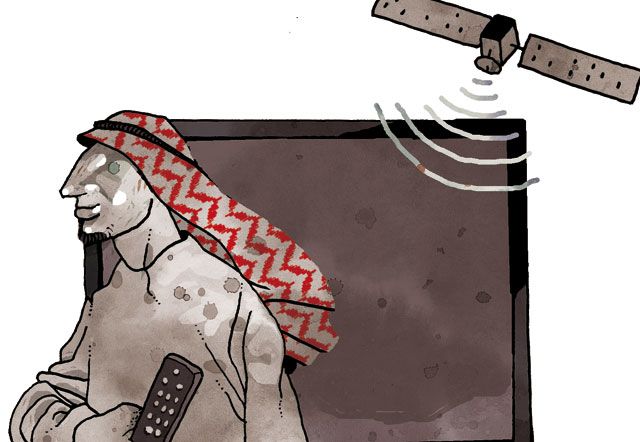You in the Arab satellite channels have achieved more than what was achieved by all Arab nationalist political parties put together. We, as political activists, have struggled hard to unify the Arab world in one national entity, but let me tell you we have failed miserably. We could hardly keep our own party together."
He went on to add that the Arab regimes, particularly those which raised pan-Arab slogans, have, in his opinion, played a horrible disintegrating role. They have even tribalised and sectarianised our Arab homeland. But thanks to you in the satellite television industry the Arab homeland is becoming one world, the Arab doctor added.
I think that the veteran Arab doctor was right to a large degree in his appraisal of the achievements of the satellite Arab channels. Arab satellite broadcasting has, no doubt, furthered pan Arabism immensely. And when the chronicle of this period is written, the great role of Arab satellite TV in reshaping the Arab identity might feature prominently in history books, some commentators argue.
Fahmi Hwaidi, a prominent Arab journalist, writes: "Satellite broadcasting emerged at a time when regionalism and westernisation were gaining momentum in the Arab world. It also came at a time when pan-Arab thought was fighting a rearguard action. Many Arab regimes started raising the "We First" slogan in an attempt to do away with Arabism". We won't be exaggerating if we say that some Arab satellite channels consolidated Arab belongingness and preserved the one-nation notion, Hwaidi adds.
In other words, some Arab TV channels have achieved more than was achieved by the torch bearer of pan-Arab nationalism Jamal Abdul Nasser and his mouthpiece, the "Voice of the Arabs Radio".
Speeches
The few things that brought Arabs together back in the 1960s were the speeches of Abdul Nasser, the afore-mentioned radio, and Al Ahram newspaper of Egypt. Legendary Arab singer Um Kolthoom also had a very unifying effect. Millions of Arabs from the Atlantic Ocean to the Gulf listened to her songs.
But with the death of Abdul Nasser and Um Kalthoom the pan Arab dream almost came to an end.
However, thanks to the satellite revolution, the Arab masses seem to have found their new voice and identity. One can now safely talk about a big Arab village stretching from Mauritania to Jordan. The so-called Arab homeland, "Al Watan Al Arabi", which has always been an illusion politically due to colonial divisions and the parochial regimes that came to rule the Arab countries after independence, has become a reality now, culturally and mediawise.
Indeed one could safely say that Arab satellite broadcasting has become the strongest nationalistic movement in the Arab world since nationalist thought started at the end of the 19th century.
This manifested itself in having an Arab public opinion for such a long time. In the past, Arab listeners were always at the mercy of foreign radios which always tried to disallow unified Arab public opinion through its manipulated reporting and programming. But thanks to some Arab satellite TV channels, we now have a general Arab opinion regarding many issues, particularly the Palestinian and Iraqi causes. It is no longer Abdul Nasser who brings demonstrators onto the streets. It is now certain satellite stations that motivate people to fight for pan-Arab causes.
In the past, Arabs knew only their local TV presenters, whereas now they know the pan-Arab presenter. Just as the Nasserite current produced a pan-Arab journalist such as Mohammad Haikal, certain Arab channels have produced pan-Arab media stars. We are no longer talking about a Syrian or Saudi broadcaster. We now have The Arab broadcaster whom millions of Arabs receive warmly as if he were their national hero.
Even the Arab entertainment channels have played a pivotal role in bringing the Arab people together. Before the advent of the satellite revolution, the only Arab singers who managed to cross the divide and become national icons in all Arab countries were Egyptian singer Um Kolthoom, Abdul Haleem Hafed and Fareed Al Atrash. All other artists remained local. But with the help of scores of satellite channels that have sprung up, most Arab singers have become pan-Arab stars.
It is true that we do not need too many satellite channels that overfill the Arab space, but at the same time one can never ignore the fact that the new satellite wave came to stress that there is one Arab world, at least culturally, socially and religiously and even politically.
Dr Faisal Al Qasim is a Syrian journalist based in Doha. He is also a television presenter and producer of the Opposite Direction programme on the Al Jazeera channel.










